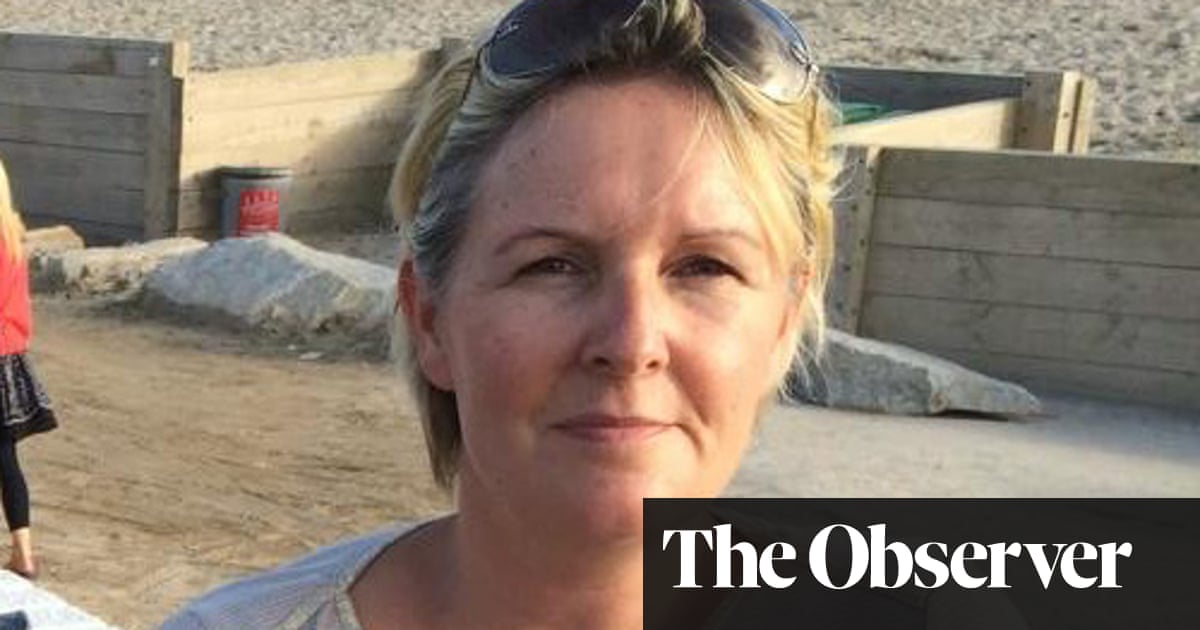
A serial violent offender who previously tried to strangle his partner was free to murder her after being wrongly assessed as “medium risk” by the probation service.
When Lee Kendall killed charity worker Michaela Hall on 31 May 2021, police had received 34 pieces of intelligence about his domestic abuse against her and he had almost 50 convictions, relating to 100 offences.
Police, social services, charities and probation workers knew that he had tried to strangle Hall, threatened her with weapons and beaten her up so badly she could not go to work.
He had been arrested 10 times for attacking the mother of two and officers had attended at least 14 times in as many months, often after calls from neighbours.
Michaela’s father, Peter Hall, told the Observer that the death of his daughter, an RNLI fundraiser, was caused not only by human errors but “systematic failings”. “It broke our hearts to hear that if these errors had not happened, our Michaela would not have died that day,” he said.
He added that his “enchanting” daughter – described as “the best mum ever” by her sons – paid “the ultimate price” for their shortcomings.
“The probation service signed her death warrant, without question,” he added. “How many people are they letting out of prison that they shouldn’t let out, that have been wrongly assessed?”
Michaela, 49, was referred to a specialist multi-agency panel six times owing to the very high risk she faced. But despite detailed knowledge of his background, the probation service assessed Kendall, 45, as a medium risk after his conviction for two assaults on Hall in early 2021.
An inquest heard he should have been classified as “high” or “very high risk” and that the assessment was done by an unqualified staff member. A supervisor then co-signed the report, telling the inquest she did sometimes skim such documents owing to what she described as “horrendous work pressures”.
Had she read it properly, she might have noticed it failed to include crucial facts including Kendall’s strangulation attempt – a red flag for future lethal violence, the inquest heard. The risk grading was also given on the assumption that Kendall would go to live in Plymouth, rather than returning to Cornwall to live with Hall, despite his saying that he intended to do so.
The report resulted in a judge imposing a non-custodial sentence on Kendall for two assaults against Hall, and he was subsequently released from prison with minimal supervision. Kendall’s case was then allocated to a private contractor, rather than the national probation service, which would have been responsible had he been classified as a more dangerous offender.
Around two weeks after his release – after other failings, including a mandatory face-to-face probation appointment not taking place – Kendall murdered Hall at her home near Truro.
The inquest heard he grabbed her by the throat and stabbed her in the head with a kitchen knife, severing an artery. He has since been jailed for life.
On Friday, Andrew Cox, senior coroner for Cornwall, said Hall’s murder was “entirely foreseeable” and could have been prevented.
He said that if Kendall’s risk had been correctly assessed, he could have been jailed then spent a period on licence where he would have been seen at least once a week. “Had the shortcomings and errors not occurred, it is more likely than not Michaela would not have died when she did,” he said.
The details of the case cast light on a probation service repeatedly found to have failed to do its job. In June 2022, Jordan McSweeney, a violent, woman-hating racist, was able to sexually assault and murder law graduate Zara Aleena after he was wrongly assessed as “medium risk”.
In September 2021, Damien Bendall, who had convictions for armed robbery and GBH, murdered his pregnant partner Terri Harris, her two children and one of their friends after being categorised as “low risk”.
Michaela Hall’s inquest heard how efforts to undo the failed privatisation of parts of the probation service had left staff overstretched. At the time of Kendall’s incorrect risk assessment, this “failed initiative” was absorbing a “considerable amount of management time”, the coroner said.
“Every hour engaged planning for the reunification was an hour not spent managing offenders. It caused additional workload to be heaped upon an already depleted workforce.”
The inquest also revealed a litany of failings by other agencies, including detailing how the police and the council did not do all they could to protect her, and how police officers failed to enter her property on the night she was murdered despite receiving a tipoff on the day she died that she was being attacked.
Her friend had told a Crimestoppers call handler that she was on the phone to Hall, who said Kendall was “on one” and had strangled her. She then heard her shout “Don’t come near me, Lee” and “Get off me”, followed by screaming and a dull thud.
The report was passed to Devon and Cornwall police but, despite it being graded urgent, it took 20 minutes for officers to be dispatched. When they arrived, they knocked at the front and back door but did not enter the property. As they drove away, one officer said she had visions of Kendall lying on Hall with his hand over her mouth. “What can you do if she don’t help herself?” the officer asked a colleague over the radio. Hall’s body was found the following night.
On Friday, a coroner said that even if they had broken in, Hall would not have survived; Kendall had injured her so badly that even if the attack had taken place on the doorstep of a hospital, it wouldn’t have mattered.
But he said that they should have done so regardless. “If they had an apprehension something serious had happened, they should have made entry to see if they could have saved Michaela’s life or limb,” he said. The coroner acknowledged the police were working in a “complex” environment and said they had been “more responsive” to Hall’s case overall than other agencies, but that he believed “not everything that could have been done was done”.
He also highlighted a failure by the council’s adult and child social services teams to share information, adding that while Hall’s two children were safeguarded effectively, Hall’s needs were not properly assessed.
Kendall’s abuse of Hall could also have been prevented had the charity where she worked when they met in around April 2019 conducted proper checks on an incomplete employment reference they had received for her.
By not doing so, the charity, which supports vulnerable people including ex-prisoners, was left unaware that Hall had been suspended from a similar role due to concerns over her professional boundaries after she gave one service user an out-of-hours lift and let another sleep in her car.
This led to her being employed in a role “she was known to be temperamentally unsuitable for”, the coroner said. “Had that never happened, she would have never met Kendall,” Peter said.
Hall’s family are now considering legal action against agencies found to have failed her and want her story to be shared so that system-wide improvements can be made.
Peter, 72, said they had been “truly shocked” by how “woefully ill-equipped risk-critical agencies are to protect us”, and that so far, he had seen nothing to reassure him that things had changed. In relation to the probation service, for instance, there was “still not a robust system in place” to check who has been allocated pre-sentence reports. “It is an accident waiting to happen,” he said.
He added that in the days before his daughter died, things had seemed to be looking up. Throughout Kendall’s campaign of abuse, Hall had initially rejected offers of help from agencies, fearing it could make things worse.
In early 2021, however, she did agree to give a statement to police, and confided in officers that she feared the violence was escalating. She later withdrew it, but Kendall pleaded guilty to two assaults – the first time he was convicted in relation to his offending against her.
He was subsequently remanded in custody, during which time Peter said his daughter appeared to undergo a “seismic shift”. Two weeks before she died, she sat in the kitchen of the family home drinking coffee with Peter and her mother, Anne, and making plans for the future that did not feature Kendall. “She was laughing and full of life,” he said. “Even her son said, ‘Mummy has changed.’”
“That’s when it’s most dangerous,” he added. “The victim realises, ‘I need to do something’. And the perpetrator knows they’re letting go.”
A Ministry of Justice spokesperson said Hall’s murder “was a horrific crime and we are deeply sorry for the unacceptable failings in this case”.
It said it had since reunified the probation service, scrapping the role of private contractors such as the one overseeing Kendall’s case, and was investing to deliver more robust supervision, reduce caseloads, and recruit more staff.
Devon and Cornwall police said the two officers who failed to enter her house had undergone a “reflective practice review” after a complaint was upheld by the police watchdog.
It said its “thoughts and sympathies” were with the family and that “no police actions were attributable to her death”.












